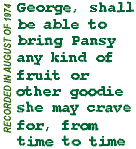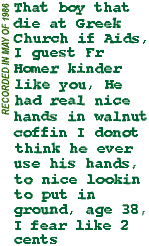His father died suddenly of a heart attack in 1953, leaving George and Pansy alone. For some reason, they started crashing social events. Uninvited and unwanted, they attended weddings, funerals, store openings, and election rallies--often more than one a day. George always dressed in a second-hand dark suit and yachting cap. Pansy was usually bundled in overcoats and flowery bonnets. George snapped countless photos of his mother posing with dignitaries, mourners, newlyweds and officials of the Catholic church. The two also collected memorabilia wherever they went, frequently taking a piece of cake, wrapped in newspaper, home with them. The cake was never eaten--just stored in the house, which became so crowded with their possessions, including Pansy's hats (she owned more than a hundred), and George's sixteen pianos and organs, that mother and son were confined to the upstairs.
Sometime in the mid-60s, George and Pansy began investing their limited resources in real estate; buying and selling valueless plots of land in the Seattle area. These investments never made much money, but they ultimately allowed George to create a strange, disjointed autobiography within the legal records of Washington State.
Whenever a parcel of land is bought or sold, the title deed is recorded on 16mm microfilm in the county courthouse for future reference. No sale of property is considered valid without a recorded title deed. In theory, the deeds are supposed to be very simple: they must list the buyer and seller and contain a legal description of the property. And that's all. But George discovered that, due to a quirk of the law, anyone who pays the nominal per-page fee (currently $7) can record anything they want as a "title deed." So George immediately began using this recording system for purposes that were never even envisioned, much less intended, by the county planners who had instituted it.
Beginning in 1968, he and Pansy traveled to the courthouse almost every business day with newspaper clippings, church programs and other items they wanted preserved. These early recordings are vague, but they establish some of George's major obsessions: Catholicism, abortion, cremation and urban renewal.
The nature of the recordings changed after Pansy suffered a stroke in the early 70s and was placed in the Columbia Lutheran Nursing Home. The newspaper clippings are replaced by what appear to be letters and notes to whoever will listen, documenting George's struggle to get Pansy out of the nursing home, and asking for help.
In 1974, George filed a court case against the State of Washington alleging that Pansy was being mistreated in the home and demanding she be released. With no legal training, George's "case" consisted mostly of color photographs he had taken of Pansy in bed, strapped to the toilet, or watching television. With the help of a prominent Greek lawyer, Harry Platis, mother and son were eventually reunited. By this time, however, Pansy was 86 years old, had been diagnosed with diabetes, and was in rapidly declining mental health. George had only a few more years left with her. She died in 1979.
Cut loose from his only responsibility, George drifted from boardinghouse to boardinghouse. He had little or no money and frequently signed his Social Security checks as "George Nutey" or "George Incompetent." He became involved in numerous relationships with other mentally retarded men, complicated by his fervent Catholicism and distaste for the "gay act." If he had one true love during this period, it was Bill Rosene, whom George would often visit at Western State Hospital, south of Seattle. George and Bill lived together for a while in a low-income apartment, but that didn't last. Afterwards, George lived for stretches in an unheated concrete basement and in the lobby of a church. He went out less, but still continued to record papers at the courthouse, commemorating important dates such as Pansy's birthday with pages of his writing.
As time went on, George's recordings grew more sexually explicit, and officials at the courthouse censored many of them by placing sheets of paper over his text when they filmed it. Because of this, the last years of his life are maddeningly vague. What is known is this: in 1989, George himself became sick. He was having trouble breathing and had developed elephantiasis in his scrotum and a painful hernia. He was hospitalized for a short while in January of 1990.
Released from the hospital, George took all of the cards and letters in his possession down to the courthouse and recorded them all in one day. It cost him over a thousand dollars; they cover almost an entire tape of microfilm. It is his last recording. He died three days later.
George's writings remain on tape, for all to see, and will probably be there forever (or at least as long as the microfilm system is still used for referencing papers--and that's going to be a long time). What follows are some selected recordings from various points in his life. No spelling, grammar, or punctuation has been changed. The entire collection of George Kotolaris' work, consisting of almost a hundred thousand pages of recorded material spanning nearly thirty years, is publicly available through the records department of the King's County Courthouse in Seattle, Washington.
(Click on each excerpt to read more)
| 1 |

|
2 |

|
| 3 |

|
4 |

|
| 5 |

|
6 |

|
| 7 |
 |
|